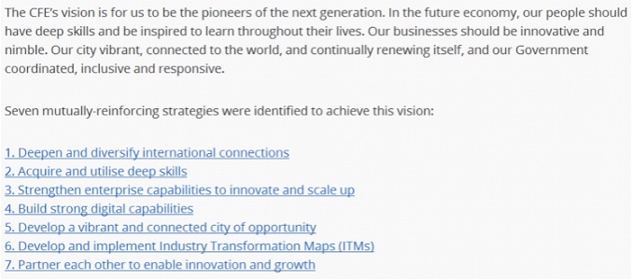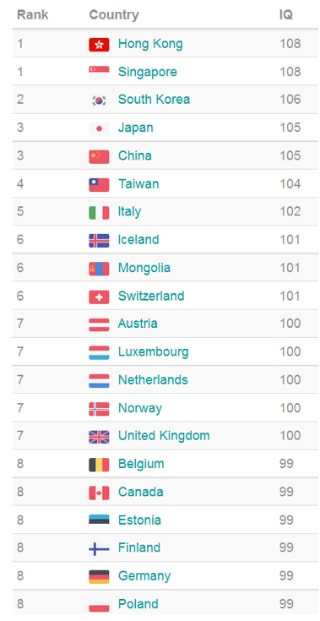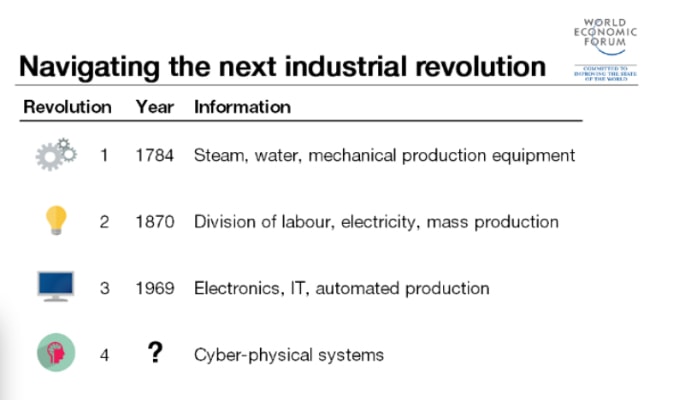An Essay on The Future Economy, Employment and The Roti Prata Career Option
Gone are the days of people discussing real estate punts or boasting about their bond portfolios, Chinese New Year 2017 has taken on a somber mood that feels almost sobering, despite trying to drown our sorrows, especially after the latest dose of government propaganda dominating local media that has conversations veering towards the need to innovate and accept changes that will be the mainstay of Singaporean life and the economy as the Committee on the Future Economy (CFE) unveiled their 7 strategies for the 5 areas—future corporate capabilities and innovation, future growth industries and markets, future of connectivity, future city and future jobs and skills.

Taken from the CFE website
Parents are now proudly boasting of their plans for their children to be ready for the new world, in taking prep coding classes as Singaporean 15 year-olds have come out top globally in math, science and reading in the 2015 PISA (Programme for International Student Assessment) test, as schools stress on higher-order thinking skills such as logical reasoning and problem-solving.
Now, all we need to do is to wait for these 15-year-olds to grow up to carry out the vision for the 5 futures because their parents are too busy making money with no time left to learn?
With the highest average IQ’s in the world, Singaporeans only have the Hongkies to rival them although it remains a mystery how Asia dominates the rankings (which suggests an uneven distribution of IQ globally especially when we note the African results coming well below normal) which perhaps attests to the education system of the country.

Source: IQ Research
Yet I also observe there is also less stigma with parents these days to admitting that their children are pursuing a vocation in the ITE as opposed to shame in the past after the campaign blitz led by PM Lee in 2015 “to persuade more youths to join the workforce under a system modeled on Germany’s apprenticeship system. The “earn and learn” program would place graduates from technical schools into jobs, while giving them the chance to continue part-time education.”
As my good friend wrote back 2 years ago, the “roti prata career option is indeed not a bad one to keep it simple, back to basics of hard work and rewards besides, we all need to eat besides the skill of making good prata.
How many a skilled cook is rewarded for his efforts in Singapore? Is that why there are less kway chap stalls these days? The trouble of waking up at 5 am to prep food as compared to the western food chap who wakes up at 10, in time to throw some frozen chicken into the deep fryer?”
She was definitely joking although times have indeed changed for we know that the kids grow up with the expectation that they will not have the prospect of an “iron rice bowl” as some bear witness to their parents retrenched from managerial posts, or positions of power, in the recent economic slowdown that we wrote about some months back in Eat, Pray, Love Stressed Out Singaporeans and the Singaporean Economy, to settle for lesser paying jobs, struggling in their middle age years to make ends meet and feeling the stress and falling sick, even for those who are gainfully employed as pessimism grows.
With IMF honcho, Christine Lagarde, telling us, “66% of jobs that will be taken by young kids in school today simply don’t exist”, it is leading to the younger generation putting off marriage and family to seek the less-encumbered and more self-sustaining lifestyles and when it comes to attitudes towards work, those that find themselves in sunset industries like banking, often feel resignation to lost hope which has become the common face of banking for bankers old and young these days.
Education is the expensive alternative to work, yes, and it may not necessarily pay off as we note some interesting facts made by Ricardo Hausmann.
- It is more about the passport. In 1965 French workers with less than 5 years schooling, earned $14,000 (inflation adjusted). In 2010, for countries averaging the amount of schooling, income was $1,000.
- In 1960, countries with better education (8.3 years) were 5.5 times richer than those on the other end of the spectrum (2.8 years). In 2010, those countries who managed to catch up (from 2.8 to 8.3 years) were only 1.67 times richer than they were in 1960.
- China made less education progress than Tunisia, Kenya, Mexico and Iran between 1960 to 2010 but the economic growth has been phenomenal.
The alternative is frightening. We are in the midst of the Fourth Industrial Revolution with robots coming after jobs in the near future as Singapore tests out driverless cars.
We can surely expect more income equality between the people who build and maintain the machines versus the machine operators or those displaced by the smart machines as Isaac Asimov predicted back in 1964.
“Not all the world’s population will enjoy the gadgetry world of the future to the full. A larger portion than today will be deprived and although they may be better off, materially, than today, they will be further behind.”— Isaac Asimov
It does look that we better erase that roti prata career option from the menu because robots could well be serving those pratas in the future, just as the 40,000 rental cars on the roads of Singapore could soon be driverless, not to mention delivery service workers.
Where are the jobs going to come from? For the middle-aged PMETs worst hit by lay-offs, lacking skills for new jobs?
We can thank UBER, GRAB CAR, Deliveroo and gang at the moment, buffering our 7-year high in layoffs, the highest since the 2009 crisis.
As the Industrial Revolution takes root, Singapore’s 7 strategies will come in handy but the labour market disruption is permanent as WEF economists point out it will give rise to “a job market increasingly segregated into “low-skill/low-pay” and “high-skill/high-pay” segments, which in turn will lead to an increase in social tensions.”
Those middle aged PMET jobs are likely not coming back as “the largest beneficiaries of innovation tend to be the providers of intellectual and physical capital—the innovators, shareholders, and investors—which explains the rising gap in wealth between those dependent on capital versus labor”, which leads to stagnant incomes and demand for high skilled and low skilled workers and nothing in between.
The warning by the WEF in Jan 2016 was that we will have an unhappy middle class on our hands and they could not have been more right because we had Brexit and Trump last year. More and more countries are exploring the universal basic income concept, with Finland the first country to run a trial on her population this year.
My thoughts are that social welfare of some sort is an inevitable outcome—4 in 10 Singaporeans have not saved for retirement and they are increasingly worried which is another area of stress. This is comparable with the 1 in 3 Americans with zero savings.
The 15-year-olds will grow up and fit right into the Industrial Revolution but we know who the majority of Brexit and Trump voters are—the older workers left behind.
Hard times are definitely ahead as we hear about former brokers driving for UBER and half an Engineering class of 85 in the same business of private hire cars, the bias against older workers perhaps stemming from the hiring manager’s personal insecurities although the excuse is that younger workers are easier to manage and flexible.
Witnesses tell me stories of how certain bankers choose young inexperienced staff willing to work for low wages to cement their own managerial positions as the better staff leave eventually, having gotten little out of the job while the incompetent remain, ensuring the manager will never be replaced.
The pessimism is endemic across most industries with attitudes deteriorating and morale fading. Former line managers in middle management having to start afresh in re-training for a lesser role and feeling stressed out about their finances at the same time, a topic we have addressed 2 years ago in Equity Focus: Investing In A Terminator Future, which offered some hedge ideas in investing for the future.
My radical idea for the future is to think outside the box of conventions and start monetising the little value-adds in our lives – for instance, fetching that extra pack of lunch for a busy colleague for a dollar; or sparing a bunch of mint for a neighbour for another dollar or if your neighbour will walk your dog in return. All to be centrally managed by SmartNation which can give all residents an electronic debit account and police the system for abuse at the same time.
Pay the unemployed to pick litter? How about hooking up to a stationary bike to power electricity generators in exchange for free meals? D.I.Y. hawker kits?
Just some food for thought for the future economy and employment.



